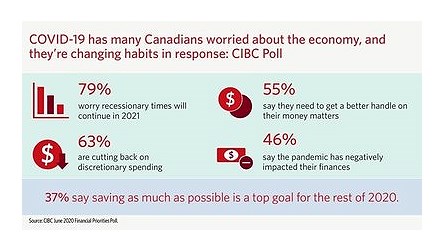CNW - COVID-19's impact on the economy is causing many Canadians to worry about the future: 79 per cent of respondents in CIBC's Financial Priorities Poll say they are concerned about continued recessionary times next year, compared to 55 per cent who said they feared an economic downturn in a December 2019 survey.
Economic worries may be a factor in why many Canadians are adjusting their financial habits.
Many respondents (63 per cent) say they have significantly cut down on discretionary spending and more than half (55 per cent) agree they need to get a better handle on their finances this year.
"It's understandable that Canadians are worried about the economy and are feeling uncertain about the impact on their ambitions, but this is a time when good financial advice conversations are most valuable, including assessing your overall situation, looking at opportunities to improve cash flow, and adjusting your financial plan if necessary," said Laura Dottori-Attanasio, Group Head, Retail and Business Banking, CIBC. "It's a positive sign that many Canadians are taking a responsible approach to the situation by making changes to their spending and working to limit unnecessary debt. Good cash flow management now can help you through the current situation, and over the longer term free up funds to divert towards savings or other goals."
The survey also found that 46 per cent of Canadians say the economic impact of the pandemic has adversely affected their finances and a similar number (47 per cent) feel it will take more than a year to get their personal finances back on track. Canadians are prioritizing building an emergency fund in 2020, citing this as a top goal for the remainder of the year, followed by steering clear of adding on debt. Of the 22 per cent of respondents who've had to borrow more in the past 12 months, the number one reason was for day-to-day items (38 per cent) followed by a loss of income (28 per cent).
"The impact of the pandemic will be felt by Canadians for some time. While we have a long way to go to get back to a normal economy, taking charge of your finances now with a savings and debt management plan is an important step towards putting your personal finances back on track," added Ms. Dottori-Attanasio.
The survey also found:
Top financial goals for the remainder of 2020 are: generally saving as much as possible (37 per cent), and avoiding taking on more debt (36 per cent)
Close to three-fourths of Canadians (74 per cent) say the uncertainty of the current environment makes it difficult to plan ahead, and over half (54 per cent) are generally worried about their financial future
The number of people who say they've taken on more debt is lower (22 per cent) than in December 2019 (28 per cent). Among those who have taken on more debt, 38 per cent say they did so to cover day-to-day expenses or due to loss of income (28 per cent) and job loss (18 per cent, +9 per cent from December 2019)
Regionally, the poll found differences in how Canadians are tightening their wallets. Residents in the Prairies say they are cutting discretionary spending the most, led by 76 per cent of those in Saskatchewan and Manitoba, and 69 per cent of Albertans, compared to the national average of 63 per cent
At 58 per cent, taking on more debt to pay for day-to-day items was the highest in British Columbia, 20 per cent higher than the national average of 38 per cent
Disclaimer: From June 8th to June 9th 2020 an online survey of 1,517 randomly selected Canadian adults who are Maru Voice Canada panelists was executed by Maru/Blue. For comparison purposes, a probability sample of this size has an estimated margin of error (which measures sampling variability) of +/- 2.5%, 19 times out of 20. The results have been weighted by education, age, gender and region (and in Quebec, language) to match the population, according to Census data. This is to ensure the sample is representative of the entire adult population of Canada. Discrepancies in or between totals are due to rounding.



